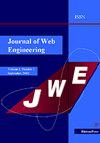A Study and Analysis of a New Hybrid Approach for Localization in Wireless Sensor Networks
IF 0.7
4区 计算机科学
Q4 COMPUTER SCIENCE, SOFTWARE ENGINEERING
引用次数: 0
Abstract
Accurate localization of nodes in a wireless sensor network (WSN) is imperative for several important applications. The use of global positioning systems (GPS) for localization is the natural approach in most domains. In WSNs, however, the use of GPS is challenging because of the constrained nature of deployed nodes as well as the often inaccessible sites of WSN nodes deployment. Several approaches for localization without the use of GPS and harnessing the capabilities of the received signal strength indicator (RSSI) exist in literature, but each of these makes the simplifying assumption that all the WSN nodes are within the communication range of every other node. In this paper, we go beyond this assumption and propose a hybrid technique for node localization in large WSN deployments. The hybrid technique comprises a loose combination of a machine learning (ML) based approach for localization involving random forest and a multilateration approach. This hybrid approach takes advantage of the accuracy of ML localization and the iterative capabilities of multilateration. We demonstrate the efficacy of the proposed approach through experiments on a simulated set-up and follow it up with a feasibility demonstration through a prototypical implementation in the real world.一种新的混合定位方法在无线传感器网络中的研究与分析
无线传感器网络(WSN)中节点的精确定位对于几个重要应用来说是必不可少的。使用全球定位系统(GPS)进行定位是大多数领域的自然方法。然而,在无线传感器网络中,由于部署节点的受限性质以及无线传感器网络节点部署的站点往往不可访问,GPS的使用具有挑战性。文献中存在几种在不使用GPS和利用接收信号强度指示器(RSSI)的能力的情况下进行定位的方法,但每种方法都简化了所有WSN节点都在每个其他节点的通信范围内的假设。在本文中,我们超越了这一假设,提出了一种在大型WSN部署中用于节点定位的混合技术。该混合技术包括用于涉及随机森林的定位的基于机器学习(ML)的方法和多点定位方法的松散组合。这种混合方法利用了ML定位的准确性和多点定位的迭代能力。我们通过在模拟装置上的实验证明了所提出方法的有效性,并通过在现实世界中的原型实现进行了可行性论证。
本文章由计算机程序翻译,如有差异,请以英文原文为准。
求助全文
约1分钟内获得全文
求助全文
来源期刊

Journal of Web Engineering
工程技术-计算机:理论方法
CiteScore
1.80
自引率
12.50%
发文量
62
审稿时长
9 months
期刊介绍:
The World Wide Web and its associated technologies have become a major implementation and delivery platform for a large variety of applications, ranging from simple institutional information Web sites to sophisticated supply-chain management systems, financial applications, e-government, distance learning, and entertainment, among others. Such applications, in addition to their intrinsic functionality, also exhibit the more complex behavior of distributed applications.
 求助内容:
求助内容: 应助结果提醒方式:
应助结果提醒方式:


